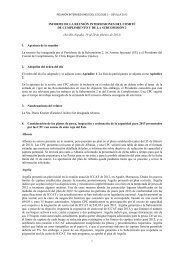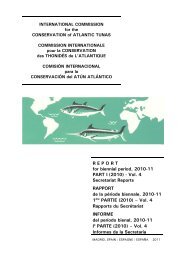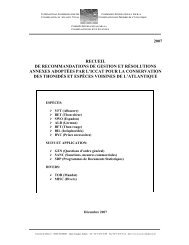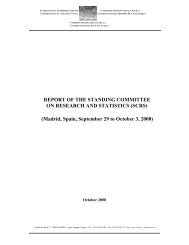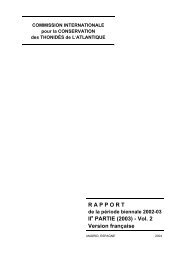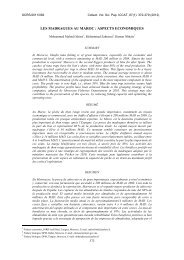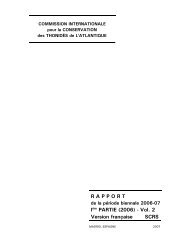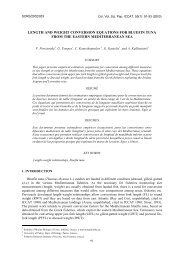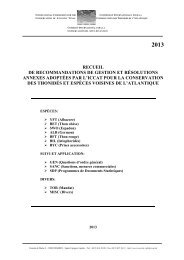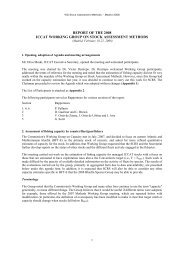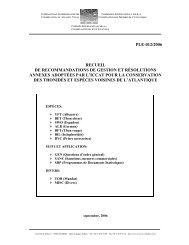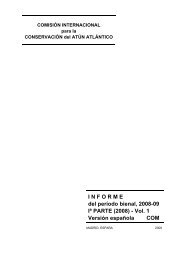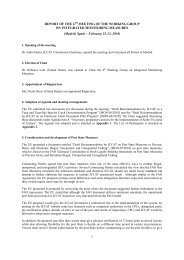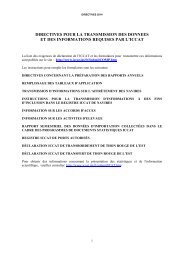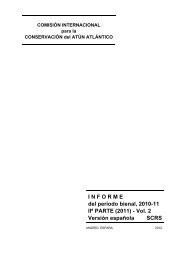E - Iccat
E - Iccat
E - Iccat
Create successful ePaper yourself
Turn your PDF publications into a flip-book with our unique Google optimized e-Paper software.
ICCAT REPORT 2012-2013 (I)<br />
6.2 Traceability system for all bigeye, yellowfin, and skipjack tuna products<br />
Taking into account the outcomes of the Kobe process, Japan presented a document entitled “Draft<br />
Recommendation by ICCAT on a Catch Certification Scheme for Skipjack, Yellowfin and Bigeye [Albacore]<br />
Tuna [and Swordfish]” (see Appendix 3 to ANNEX 4.1). Japan noted that the current bigeye statistical document<br />
program only covered a portion of total bigeye catches and lacked a catch certification process and further<br />
explained the proposal was intended to address both of these issues without being as comprehensive as the bluefin<br />
catch documentation scheme. Japan also considered that it would be most convenient for every CPC if the<br />
Japanese proposal was based on the EU IUU regulation which many CPCs have already implemented. Most of the<br />
participants noted the benefit of establishing a broader ICCAT scheme. They also noted that duplication should be<br />
avoided with the existing documentation schemes.<br />
The Working Group discussed the scope of the proposed scheme; some CPCs suggested that it should cover<br />
albacore and swordfish in addition to bigeye, yellowfin, and skipjack tuna.<br />
The Working Group also discussed the costs of these programs for developing states, importers and exporters, and<br />
the ICCAT Secretariat. With that in mind, the Chair requested that Japan and the EU, as co-sponsors of the<br />
proposal, consult with the ICCAT Secretariat to develop a cost estimate for the program. The Chair also asked all<br />
ICCAT CPCs to review the appendices in the document and provide comments to Japan and the EU before the<br />
next ICCAT Annual Meeting.<br />
The United States and Turkey expressed general reservations to this proposal.<br />
The views of certain CPCs on this proposal are attached in Appendix 7 to ANNEX 4.1.<br />
6.3 Port State measures, including port inspection scheme<br />
The EU introduced document entitled “Draft Recommendation by ICCAT for an ICCAT Scheme for Minimum<br />
Standards for Inspection in Port” designed to strengthen ICCAT’s existing port inspection scheme [Rec. 97-10].<br />
Several CPCs noted that, pending progress in the ongoing discussions of a full ICCAT Port State Measures<br />
scheme, there was a need to strengthen and update ICCAT’s port inspection requirements. The Working Group<br />
discussed and amended the draft proposal, and the revised draft is appended as Appendix 4 to ANNEX 4.1.<br />
Several issues remain in brackets. The Working Group noted the link between this measure and the provisions of<br />
ICCAT’s IUU vessel list.<br />
6.4 At sea boarding and inspection scheme<br />
Canada noted the importance of this issue and recalled that its proposal from 2008 was still on the table but that<br />
they did not intend to press for a detailed discussion of it at this meeting. Some Parties noted the need to make<br />
progress on this issue as it represents an important Monitoring Control and Surveillance (MCS) tool and<br />
considered that further discussion should be undertaken at the 2012 ICCAT Annual Meeting in a fishery by fishery<br />
context.<br />
6.5 Vessel Monitoring Systems<br />
The United States introduced the proposal entitled “Draft Recommendation Amending the Recommendation by<br />
ICCAT Concerning Minimum Standards for the Establishment of a Vessel Monitoring System (VMS) for the<br />
ICCAT Convention Area that would modify paragraph three of the Recommendation by ICCAT Concerning<br />
Minimum Standards for the Establishment of a Vessel Monitoring System (VMS) for the ICCAT Convention Area<br />
[Rec. 03-14]. Specifically, vessels subject to Rec. 03-14 would need to increase the frequency that their VMS units<br />
provide geographic position data from at least every six hours to at least every two hours in line with scientific<br />
advice. Vessels would continue to provide summary data on at least a daily basis consistent with the existing<br />
measure. Discussions ensued on potential costs associated with increased VMS transmission rates, the rationale<br />
for selecting this frequency, regions and species that should be affected by this measure, and transmission rates in<br />
other RFMOs. Most Parties supported the proposed modification; however, two Parties noted support for the status<br />
quo. A 4-hour polling rate was discussed as an alternative, but some had concerns that this was still not frequent<br />
enough to ensure effective monitoring and control. Another alternative put forward was that increased polling<br />
frequency should only apply to bluefin tuna fisheries in the Mediterranean Sea but this limited scope could not be<br />
agreed. The Working Group agreed that this was a very important issue and that it should be further considered at<br />
the 2012 Commission meeting. The proposal is attached as Appendix 5 to ANNEX 4.1 to facilitate Commission<br />
66



